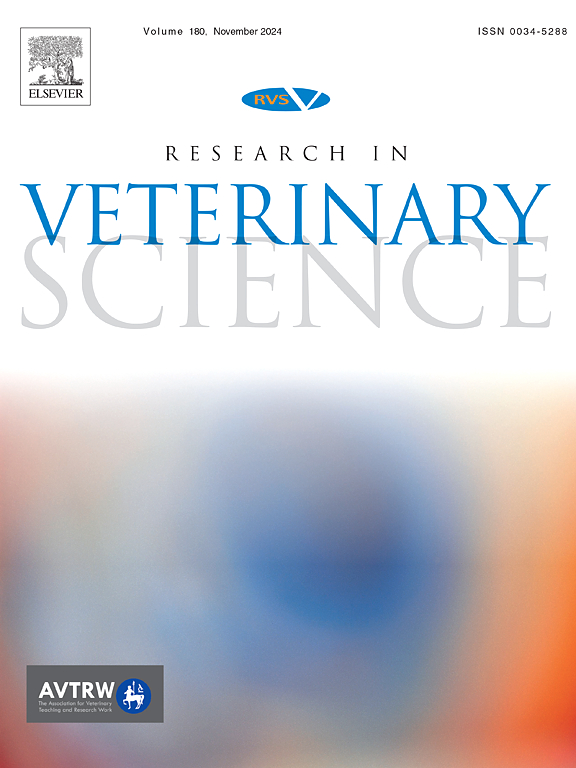来自非洲猪瘟病毒感染猪的外泌体通过NF-κB和JAK-STAT信号通路介导免疫应答
IF 2.2
3区 农林科学
Q1 VETERINARY SCIENCES
引用次数: 0
摘要
非洲猪瘟(ASF)病毒(ASFV)是一种影响养猪业的传染病,造成高达85%的发病率和100%的死亡率。迄今为止,还没有针对非洲猪瘟的可用疫苗。外泌体是从大多数细胞类型释放出来的细胞外囊泡。外泌体携带核酸、脂质和蛋白质等成分,在细胞间通讯中起着至关重要的作用。本研究研究了从感染asfv的猪血清中提取的外泌体对猪巨噬细胞系的影响。从感染ASFV的猪血清中提取的外泌体含有ASFV结构蛋白(p30和p72)。猪巨噬细胞中干扰素(IFN)-α、IFN-γ、IL-6和CXCL8的表达水平受到来自asfv感染猪血清的外泌体的影响。核因子-κB (NF-κB)和Janus kinase/signal transducers and activators of transcription (JAK/STAT)信号通路在ASFV感染的免疫应答中发挥重要作用。asfv感染猪的外泌体影响NF-κB、坦克结合激酶1 (TBK1)、JAK1、JAK2和STAT1的mRNA和蛋白水平,表明asfv感染猪的外泌体通过调节炎症细胞因子的表达以及NF-κB和JAK-STAT信号通路的活性来介导抗病毒反应。本研究为猪感染ASFV的外泌体的免疫调节作用提供了新的信息,提高了我们对ASFV发病机制和宿主对ASFV感染的免疫反应的认识。本文章由计算机程序翻译,如有差异,请以英文原文为准。
Exosomes derived from African swine fever virus-infected pigs mediate immune responses through NF-κB and JAK-STAT signaling pathways
African swine fever (ASF) virus (ASFV) is an infectious disease that affects the pig industry, causing up to 85 % morbidity and 100 % mortality. To date, there are no available vaccines against ASFV. Exosomes are extracellular vesicles that are released from most cell types. Exosomes carry components such as nucleic acids, lipids, and proteins that play a vital role in cell-to-cell communication. This study investigated the effect of exosomes derived from the serum of ASFV-infected pigs on a porcine macrophage cell line. Exosomes derived from the serum of pigs infected with ASFV contained ASFV structural proteins (p30 and p72). Expression levels of interferon (IFN)-α, IFN-γ, IL-6, and CXCL8 in porcine macrophage cells were affected by exposure to exosomes derived from the serum of ASFV-infected pigs. Nuclear factor-κB (NF-κB) and Janus kinase/signal transducers and activators of transcription (JAK/STAT) signaling pathway play an important role in the immune response to ASFV infection. Exosomes derived from ASFV-infected pigs affected mRNA and protein levels of NF-κB, tank binding kinase 1 (TBK1), JAK1, JAK2, and STAT1, suggesting that exosomes derived from ASFV-infected pigs mediate antiviral response by modulating the expression of inflammatory cytokines and activity of the NF-κB and JAK-STAT signaling pathways. The present study provides novel information about the immunomodulatory effects of exosome derived from pigs infected with ASFV, improving our understanding of ASFV pathogenesis and the host immune response to ASFV infection.
求助全文
通过发布文献求助,成功后即可免费获取论文全文。
去求助
来源期刊

Research in veterinary science
农林科学-兽医学
CiteScore
4.40
自引率
4.20%
发文量
312
审稿时长
75 days
期刊介绍:
Research in Veterinary Science is an International multi-disciplinary journal publishing original articles, reviews and short communications of a high scientific and ethical standard in all aspects of veterinary and biomedical research.
The primary aim of the journal is to inform veterinary and biomedical scientists of significant advances in veterinary and related research through prompt publication and dissemination. Secondly, the journal aims to provide a general multi-disciplinary forum for discussion and debate of news and issues concerning veterinary science. Thirdly, to promote the dissemination of knowledge to a broader range of professions, globally.
High quality papers on all species of animals are considered, particularly those considered to be of high scientific importance and originality, and with interdisciplinary interest. The journal encourages papers providing results that have clear implications for understanding disease pathogenesis and for the development of control measures or treatments, as well as those dealing with a comparative biomedical approach, which represents a substantial improvement to animal and human health.
Studies without a robust scientific hypothesis or that are preliminary, or of weak originality, as well as negative results, are not appropriate for the journal. Furthermore, observational approaches, case studies or field reports lacking an advancement in general knowledge do not fall within the scope of the journal.
 求助内容:
求助内容: 应助结果提醒方式:
应助结果提醒方式:


